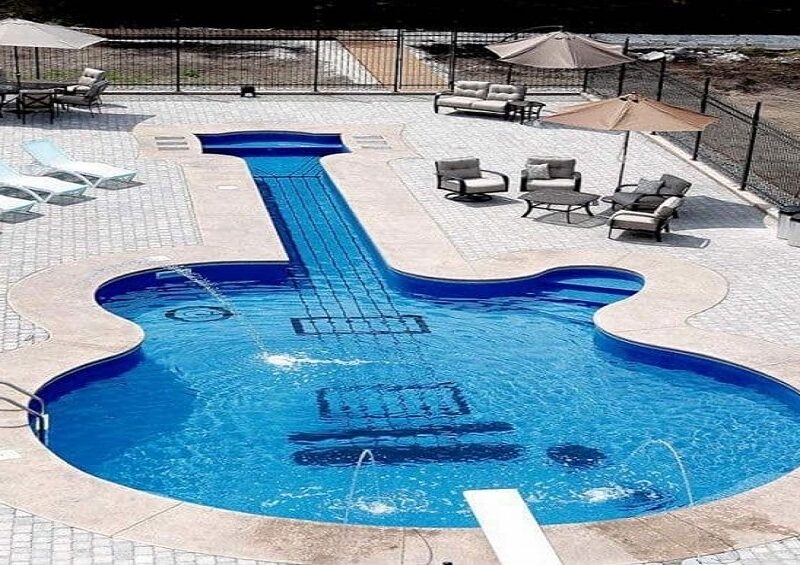When it comes to choosing a swimming pool, you have a few options to consider: vinyl liner, concrete, and fibreglass pools. We understand that buying a pool is a big decision, and you want to make sure you choose the right one. That’s why we’ve put together this article to help you determine which pool option is best for you.
Advantages of a vinyl liner pool
If you’re looking for the most affordable initial investment in a pool, a vinyl liner option takes the lead. This can be particularly appealing to individuals who have a limited budget.
You can choose the shape you want your vinyl liner pool to be
Traditional vinyl liner pools usually come in a standard rectangle shape, but if you’re willing to invest extra, you can customise the size, depth, and shape of your vinyl liner pool according to your preferences.
Disadvantages of a vinyl liner pool
One significant drawback of a vinyl liner pool is the need to replace the inner vinyl lining every 5 to 10 years. This can become a costly expense over the lifespan of the pool, considering that the average price of a vinyl liner is around $4,000.
The liner isn’t very durable
Another drawback of owning a vinyl liner pool is that the liner is not as durable as the surfaces of fibreglass and concrete pools. Vinyl liners are more susceptible to splits and tears, which can occur when outdoor objects are blown into the pool by the wind or when dogs scratch the sides.
They can house algae and bacteria
While the majority of the vinyl lining in a pool is nonporous, certain areas, such as the seams and under the pool ladder, are susceptible to the growth of algae and bacteria. These areas create conditions that promote the accumulation of unwanted microorganisms.
Advantages of concrete pools
Unlimited shapes, depths, and designs
Concrete pools offer complete freedom in designing and styling. They are the preferred choice for individuals who desire a specific shape or depth that may not be readily available in fibreglass or vinyl liner pools. Concrete allows for the creation of a pool that perfectly suits individual preferences and requirements.
Strong and durable
Concrete pools are known for their exceptional strength and durability, often lasting for over 25 years. The interior surface of a concrete pool typically remains in good condition for approximately 10 years before requiring resurfacing to maintain its longevity.
Disadvantages of a concrete pool
Higher level of maintenance required
The high porosity of the interior surface of a concrete pool provides an ideal environment for the growth and multiplication of bacteria. Concrete pools are susceptible to algae infestations, which can be challenging to eliminate completely. Regularly brushing the surface of the pool every week is recommended to minimise the risk of algae growth.
Higher doses of chemicals needed
Concrete pools are susceptible to algae and bacteria, requiring more money to be spent on chemicals to resolve these issues. The alkaline nature of concrete can also alter the chemistry levels of the pool water, resulting in additional costs for chemical balancing.
Not a good option for a salt chlorinator system
While it is possible to use salt in a concrete pool, it is not advisable. Salt affects the surface of concrete pools, leading to more frequent resurfacing requirements. Using salt in a concrete pool can be an expensive choice.
Expensive initial and ongoing costs
Concrete pools are not a cost-effective option for those looking for an inexpensive pool. The average installation cost of a concrete pool ranges from $50,000 to $100,000, depending on the size and design. Concrete pools require more effort and chemicals compared to vinyl liner and fibreglass pools. Additionally, they need an acid wash every 3 to 5 years, and resurfacing costs around $10,000, which should be done every 10 years.
They take a long time to build
Advantages of fibreglass pools
Minimal upkeep required
Fibreglass pools require minimal effort from the homeowner. As a result, they require less money and time to keep clean compared to vinyl liner and concrete pools. Fibreglass pool owners generally spend a quarter of the time and money that owners of other types of pools do.
Quick installation
Once you have chosen a fibreglass pool, it can be delivered and installed in as little as 7 days.
Extreme tactile strength
Advances in fibreglass technology allow these pools to be built with superior strength. They are designed to have a slight flex to accommodate earth movements and will not puncture or crack over the lifetime of the pool.
Contemporary designs
Most fibreglass pool designs have a modern appearance and can completely transform any backyard into a beautiful focal point.
Suitable for a salt chlorinator system
Fibreglass pools are highly compatible with salt water. Unlike concrete pools, salt does not damage the interior surface of fibreglass pools. However, it is abrasive on concrete and erodes the metal and aluminium coping found in vinyl liner pools.
An asset to your property
If you ever decide to sell your home, it’s crucial to ensure that the newcastle pool you choose attracts buyers rather than deter them. Buyers prefer cost-effective pools that are easy to maintain, and a fibreglass pool is the most hassle-free option on the market.
They are suitable for practically any site
Fibreglass pools can be constructed in-ground, partially above ground, and above ground, making them adaptable to virtually any backyard.
Disadvantages of fibreglass pools
The initial cost is higher than vinyl liner pools
While installing a vinyl liner pool is cheaper than a fibreglass pool, it’s important to consider the ongoing cost associated with a vinyl liner pool. Replacing the vinyl liner every 5 to 10 years ends up being more expensive over the pool’s lifespan. In contrast, fibreglass pools do not require replacement at any point.
A fibreglass pool isn’t customisable
One disadvantage of a fibreglass pool is that it doesn’t allow for extremely deep pools or specific shapes or designs. However, reputable fibreglass pool companies offer a vast selection of pools to choose from, making it highly unlikely that you won’t find something suitable for your home and lifestyle.
So which pool has more pros than cons?
When considering the overall cost throughout the pool’s lifetime, a fibreglass pool is the best option. Although it has a higher initial installation cost compared to vinyl liner pools, it doesn’t require constant interior replacements or resurfacing like vinyl liner and concrete pools. Fibreglass pools are easy to maintain, require fewer chemicals to keep them clean, and are highly compatible with salt water, unlike other types of pools.
If you need more information about the suitability of a fibreglass pool for your home, feel free to contact our friendly team at Newcastle Swimming Pools today to discuss your options.










